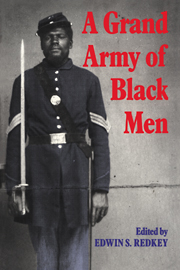Book contents
- Frontmatter
- Contents
- Preface
- Acknowledgments
- List of Abbreviations
- Introduction: For Freedom and Equality
- 1 Black Soldiers in White Regiments
- 2 South Carolina, Georgia, and Florida
- 3 Virginia and North Carolina
- 4 The Gulf States
- 5 Occupation Duty
- 6 For the Rights of Citizens
- 7 The Struggle for Equal Pay
- 8 Racism in the Army
- 9 The Navy
- 10 War's End
- Index
- Cambridge Cultural Social Studies
- Frontmatter
- Contents
- Preface
- Acknowledgments
- List of Abbreviations
- Introduction: For Freedom and Equality
- 1 Black Soldiers in White Regiments
- 2 South Carolina, Georgia, and Florida
- 3 Virginia and North Carolina
- 4 The Gulf States
- 5 Occupation Duty
- 6 For the Rights of Citizens
- 7 The Struggle for Equal Pay
- 8 Racism in the Army
- 9 The Navy
- 10 War's End
- Index
- Cambridge Cultural Social Studies
Summary
WHEN, in 1978, the late Bell Irvin Wiley wrote a new introduction to his book The Life of Billy Yank: The Common Soldier of the Union, he sadly noted “a dearth of letters written by the 200,000 blacks who donned the blue. A careful search has turned up less than a score of these sources.” Wiley's book gives an excellent picture of the daily lives, routines, thoughts, and concerns of Yankee soldiers, and part of a chapter is on the black troops. But without the breadth and depth of documents written by the black soldiers themselves, neither Wiley nor any other historian has been able fully to document the roles played by African Americans in the Civil War.
Private letters of black soldiers may have vanished, but others have now reappeared. A massive quantity of official correspondence by and about black soldiers has been found in the National Archives. And many soldiers wrote “letters to the editors” of black and abolitionist newspapers, to tell their friends at home about their experiences, their fears, and their hopes. This book is a selection of such letters by black soldiers published in newspapers during the war years.
THE NEWSPAPERS
During the Civil War, two nationally read newspapers were published by black Americans: the Christian Recorder, of Philadelphia, and the Weekly Anglo-African, of New York City. The Recorder was the official organ of the African Methodist Episcopal (AME) Church. The Church had been established in 1816 by several congregations of black Methodists who had withdrawn from white dominated churches because of racial discrimination.
- Type
- Chapter
- Information
- A Grand Army of Black MenLetters from African-American Soldiers in the Union Army 1861–1865, pp. ix - xviPublisher: Cambridge University PressPrint publication year: 1992

